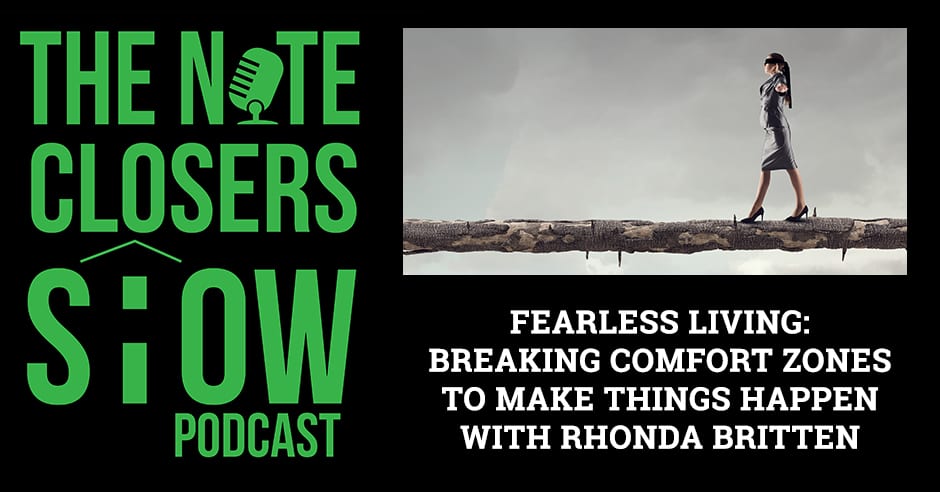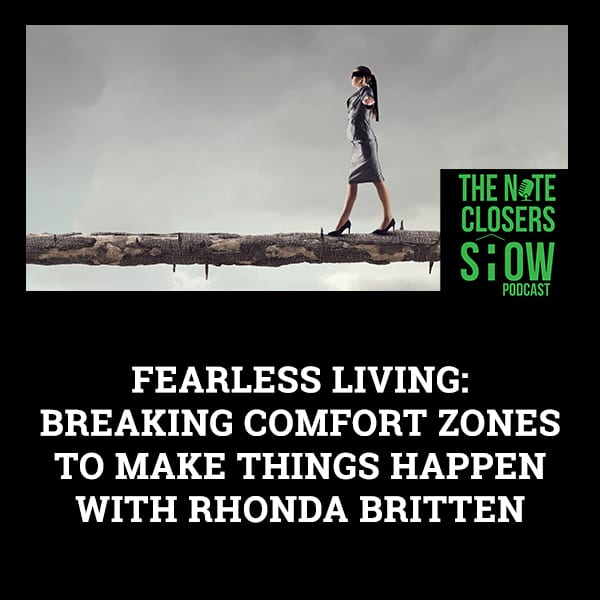
Are you dealing with a mental block of some sort or are you looking to do big things in the new year but don’t know where to start or afraid to? In this episode, learn about fearless living with a world-class keynote speaker, television personality, and a master life coach. Rhonda Britten talks about gunning for a huge New Year’s resolution while keeping your feet on the ground to actually achieve it. With host, Scott Carson, they dive into energy fields and the importance of matching these fields with your commitment to embody the success that you’re working hard to achieve. Each person has fears in their lives, and we think that to overcome these fears is to confront them. Get to know why you should not only confront but love your fears instead, for you to grow by identifying, facing, and seeing your fear for what it is. Rhonda talks about the different kinds of people you’ll encounter and the difference between fear junkies and fear busters in your life.
—
Watch the episode here
Listen to the podcast here
Fearless Living: Breaking Comfort Zones To Make Things Happen With Rhonda Britten
I am jacked up to have a friend on here that is going to help a lot of you guys out there in note nation that are reading on a regular basis. If you’re sitting there like, “I want to do some big things and I don’t know how I’m going to get there.” Maybe you’re dealing with a mind-block or maybe you’re a little self-deprecating like, “I can’t do that.” I’m here to tell you that you can. Our guest is a rock star who has been helping a lot of people accomplish some big things and she’s done an amazing job out there as the who’s who of life coaches.
She’s an Emmy Award winner and a repeat Oprah guest. Rhonda was the first life coach in reality television in the world on the first show of its kind, Life Doctor. It was changed to Help Me Rhonda. She changed lives on the hit NBC reality show Starting Over and named its “most valuable player” by The New York Times and heralded as America’s Favorite Life Coach by TV Guide. Rhonda has altered lives in over 600 episodes of reality television that aired in more than 25 countries and impacted millions worldwide.
She is a recipient of the Smart Women of the Year Award, Coach of the Year, a blog favorite at HuffingtonPost.com, speaks at TEDx and for numerous corporations and organizations such as Southwest Airlines, Blue Shield, Northrup Grumman and many more. Rhonda’s four books include her bestselling Fearless Living, which shares her groundbreaking work called the Wheel of Fear, Change Your Life in 30 Days, Fearless Loving and Do I Look Fat in This?, which I love. She’s a world-class keynote speaker, television personality, master life coach, and also a dear friend of ours. We are honored as always to have the one and only Rhonda Britten joining us.
Thank you, Scott. I am excited to be here and at the end of the year, we do some mind messing because we look back at the year and go, “I did this.” We have some proud moments, we have some yes and then we go, “I didn’t do that again.” We have this wide-open stretch in front of us called the next year. As you and I both know, 82% of people do not achieve their New Year’s resolutions. We’ve got this wide path of this New Year coming out with a failure rate of 82%, so we have this mix of excitement and dread all at once.
Nobody likes to deal with the downers out there, but it happens. Do you think it’s because a lot of times people are maybe over-committing themselves or over resolutions themselves versus being focused to drift with what they’re trying to accomplish?
You’re making a great point. People do over-commit and they’re unrealistic. Not that they can’t make their New Year’s resolution come true, but they’re unrealistic at the time, lag, and effort it takes. You and I both know and the note nation knows as well that it takes effort, commitment, and devotion to do your best work, to make the money you want, to fulfill your dream, etc. Most people in their New Year’s resolution get all hyped up. They’re like, “I’m going to lose twenty pounds in one way. I’m going to make $1 million in a month.” We want to build that momentum. I love using the New Year momentum because there is an energy out in the world. We want to tap into that energy field, but we also want to do it from a grounded and fearless perspective, from a foundational level, and not get up high in the sky and not having our feet on the ground as well. It’s great to have a big dream. Play big and go for it and your feet have to be on the ground so that you can take action necessary.
Especially your numbers, with us teaching many students and having many people that have gone through our coaches, you see the failure rate and you see when people are like, “I’m going to do this.” Let’s make it a little bit more realistically. If you’ve never made $100,000, you can’t go and say you’re going to make $1 million.
What a lot of people don’t understand is money is energy. Tell me the most money you’ve ever made. Let’s say it’s $50,000. Awesome. You have an energy field of $50,000. If you want to make $100,000, that means doubling your energy field. Making $50,000 versus $100,000 has a different level of commitment. You have to grow in order to claim that $100,000. To make $1 million, I guarantee you you’re going to be on the ride of your life. The more that you can be fearless and not let fear drag you down, the more you’re going to be able to achieve it and embody the tools and skills that you’re learning along the way.
Let’s talk a little bit more about that fearlessness out there. I know that’s always the biggest thing. Fearlessness of, “I want to go to the gym.” The fear of showing up to the gym, having to put on clothes to go work out, get away from the TV or pulling myself away from the job for an hour or half an hour or less. We all have different fears that constrain us. Maybe you’d agree that we’re not going to grow unless we confront those fears and get outside our comfort zones.
Not even confront, but love. I have a whole process that I help people move from the comfort zone to the stretch zone to the risk zone to die zone. I help every step of the way from your comfort zone to your stretch zone. Stretch zone is, “I know I can do it. I just haven’t done it.” The stretch zone is right next to your comfort zone. If you think of a bullseye comfort zone in the middle, it stretches that circle around it. The stretch zone is the closest to the comfort zone. It should be something you can do and you know you can do it. Because you know you can do it, it’s where you’re most ruthless with yourself and you beat yourself up the most.
In actuality, the stretch zone is where you decrease your confidence, lower your self-esteem, and not giving you the energy, courage, skill, and tools that you need to take some of those risks and dies. Comfort zone is in the middle like, “I do this all the time,” and that might be sitting on the couch, making $50,000 or be married to your beautiful wife. Your comfort zone is your life, but stretch zone are the things you know you can do but you just haven’t done. It’s where we are brutal with ourselves. I was talking to one of my clients who is 32 years old. He’s on fire and he’s an engineer. He’s starting to build his own business. We are talking about quitting beating yourself up, no more beating yourself up. He was like, “That’s how I motivate myself.” I go, “I totally get it. That’s what people believe. They think that they point out everything wrong they’re doing and everything wrong, they’re saying. That somehow, they’ll fix themselves and be better people.”
What was awesome is this client was talking to a sixth-grade class that day, so I loved it. I said to him, “That sixth-grade class, did you tell them your number one strategy for motivation to beat themselves up? Did you get them doing that? You got to get them on that.” Of course, he understood the point I was making that if you can’t teach a sixth-grader your number one strategy for motivation, it is not a good strategy. It is one that’s bringing you down. It’s that stretch zone, which is that next step to go to die zone. Skip that you New Year’s resolution and think big, which is awesome. It’s in the stretch zone where we make our progress and build our foundation. It’s where we are the most ruthlessly mean to ourselves.

Fearless Living: It takes effort, commitment, and devotion to actually do your best work.
What are some things that we can do to maybe be less ruthless to ourselves?
Not only do we have the stretch zone where we know we can’t do what we can’t do. The next circle around that is the risk zone. The risk zone is, “I don’t know if I can do it.” The die zone is like, “I don’t know if I want to do it and I’m freaking out thinking about it.” One of the exercises I want to give to your readers that I know is going to support them is a simple exercise, but don’t minimize the fact that it’s simple because it’s going to kick your butt. It is called acknowledgments. What does that mean? It means acknowledging yourself for anything new you do no matter how small it is.
Scott, notice that I didn’t ask you how well you did something. I could give a crap. All I care about is did you move forward? If you move forward, your confidence is going to increase and I promise you that if you start doing five acknowledgments a day, “I’ll take one to start. I acknowledge myself for something specific.” It’s not like, “I acknowledge myself for getting up.” You get up unless it’s hard. I want you to acknowledge something that you’re putting effort towards, you have to put some thought into, and it’s different. If you haven’t gone to the gym, then going to the gym, great. If you haven’t followed through on your sales calls and you’re following through, awesome. “I acknowledge myself for this.” Do five of those a day. I guarantee you within 1, 2 or 3 days, you’re already going to start feeling more confident.
It’s true because you’re rewiring that negative Nancy that’s inside of us all the time. You’re reprogramming to be focused on the positive. Let’s face it, one of the big things we do a lot with our students is it’s all about you got to be marketing for deals. You’d be marketing to raise capital. Many people are sending in an email blast out to their audience and they’re all excited because they get people that respond with, “This is awesome,” but that one person that says, “You’re an idiot. What are you doing?”
It’s like that little inside voice that stops people from doing it. I spent this time with somebody one time and we set up this weird long email campaign. It was kicking butt. I spent a lot of time with her on it. She sent out the first email and never sent the rest of them all out. She’d got to hit only one button to do it. She’s like, “I had somebody say something negative.” I’m like, “Yes, but in the first email, you had 30 people that said they wanted to invest with you. Only one person said it’s ugly and you didn’t take action.” We see this over and over again.
That’s the difference between fear junkies and fear busters. Fear junkies are the people in your life that are going to mirror your fears. We all have these hidden fears and I call it the Wheel of Fear. We all have one fear that’s driving us and once you understand your wheel of fear, everything makes a lot more sense. She had it her little voice inside her head in fear saying, “People are going to hate me. I can’t ask for money.” She had all of that stuff going on in the inside. She had a fear junkie mirror that fear back. What people do when they don’t understand how fear works, they believe that’s a sign from the universe that they shouldn’t do it.
“I know people wouldn’t like it.” Let me give you a secret, Scott. I was telling my clients, a third of the people that you encounter in your life, you are not their cup of tea and they are not going to like you all that much. They’re going to look at you, give you dirty looks, and roll their eyes. They could care less about you. A third of the people are indifferent to you. They like you and don’t like you. They don’t not like you, but they don’t love you either. A third of the people love you and those are your fear busters. Those are the people that you want to court, you want to connect with, and are going to support you moving forward and your dream.
This is the problem, Scott. Most of our family are usually in the, “I don’t like you that much. I’m indifferent to you.” This is what we do, Scott. I know I did this for most of my life. We try to change people’s minds about us to get them in the love category because then that relationship is more meaningful. If I can get somebody from not liking me to loving me, then I’m amazing. What I have to say to you is, “Don’t waste your time. That person is a fear junkie. They are not on your team. You’ve got to find your team members.” That woman that you helped with that campaign who only sent one email out and got one negative Nancy back that was echoing her fears. She decided that her fear was more real than her dream.
I love your three buckets of people who would come in. I heard you say that at Secret Knock years ago. That’s been something that I’ve adopted and people heard me say that a few times because you’re not going to make everybody happy. It doesn’t matter what you do.
You’re not supposed to. They’re not your people. We all think that if we’re nice, loving, kind, and hardworking people, we’re going to get that false dream of like, “Everyone’s going to love us and we’re going to be successful.” That’s not how it works and that’s not how it’s supposed to work. When I tell people that’s not how it works, they’re like, “Why not?” That wouldn’t cause you to create more growth and it wouldn’t cause you to go and learn. It wouldn’t help you face all those fears that have been stopping you for years or decades. I always say that my business is my spiritual journey. My business makes me grow, change, and become more flexible, open-minded, connected, and ask for help more, and give and receive love and connection. More than anything I’ve ever done in my life, my business is my self-improvement program.
Do you think that with all the social media, that’s making people see that negativity out there? I’m a big believer that if you look at what’s going on online, there’s nothing but negativity a lot of times. Especially in the news and the media, everything’s all negative. It feeds into a lot of these fear mongers. It’s one of the best ways for people to maybe get away from that or limit their exposure to that.
You know what activates you, what you can handle, and what you can process. For instance, if you can watch social media and you have the awareness to be able to filter it through what works for you and what doesn’t, awesome. Pay attention to social media. If you go on social media and you’re like a sieve, you soak it all up. You don’t have any boundaries or any ability to say, “No, that’s not for me,” then don’t do it. The bottom line is you’ve got to take care of yourself. While you’re growing, changing, learning from Scott, and wanting to make more money, build a business and create a life that you love, you are more fragile than ever because you’re taking risk after risk, whether it’s a structure risk or die, you are growing and changing.

Fearless Living: It’s great to have a big dream, play big and go for it, but your feet have to be on the ground so that you can take the necessary actions.
Every step that you grow, when you move from that comfort zone to that stretch zone, I always say there’s a ring of fear around that comfort zone that gets you in that stretch. There’s a ring of fear around stretch to get to risk. There’s a ring of fear around risk to get to die. Every time that you’re wanting to change a thought, make a contact and it’s not your everyday norm that takes something of you. Neuroscience says that we are energy machines. Every time we want to change behavior and get those wires cross differently, it takes energy. We have to take care of our energy field. We have to take care of ourselves, keep ourselves “protected,” and understand that we may be going through a fragile moment from that stretch zone to risk zone to die zone. That’s not because you’re weak. That means you’re growing.
There’s a beautiful thing there as people are growing and overcoming things. When you break through something and once you get through that ring, you look back, “Maybe that wasn’t nearly as difficult as I thought it was going to be.”
This is what the cool part is. When you start getting comfortable in that stretch zone, that stretch zone gets absorbed in your comfort zone and your risk zone becomes your stretch zone. I always tell my clients, “It’s not about your little comfort zone. I want you to be comfortable everywhere. I want you to be comfortable in your skin and with strangers. I want you to be able to go anywhere, do anything, and meet anyone.” That means having a huge comfort zone, which means you have mastered those structures that can die in order to increase it.
It’s not about, “I want to get out of my comfort zone.” Yes, that is what you’re going to need to do, but eventually, that comfort zone will be big that there will be nothing that trips you up. You’ll be able to go anywhere, do anything or meet anyone. I don’t know about you, Scott. I don’t want anything or any fear to hold me back telling me I can’t do something or don’t talk to that person. I shouldn’t be selfish to make that much money. If I make that much money and people ask me for it, I better give it to them. We have many false beliefs and false conditioning about what our dreams and possibilities are. If that’s fear talking, don’t listen.
That made me think of a time we were marketing, especially when the 50 Shades of Grey series were out in books and the movies were first coming out. I did an email blast out about 50 Shades of Notes. I haven’t read the book. I haven’t watched the movie, I said, “Do you feel like you’ve got a ball gag when talking to your clients? Do you feel like certain investors and borrowers need to be spanked?” I sent it out and it was a huge open rate. I got more hate mail back from people on it than anything else. I chuckled and Steph was like, “You shouldn’t have sent that out.” I was like, “No. We’re going to be a little fun. We’re going to get outside of our comfort zone. It’s going to be different.” Overwhelming people came back and they unsubscribed me. They’re like, “We hate you.” That’s great. I’m getting rid of people.
It’s better to have a clean list than a big list. Your clean lists are your people and your third. You and I both know that you can have a 500-person list and make a lot of money. It’s not the bigness of the list. It’s the cleanup of the list. It’s the love list. It’s like, “Do they love you?” The more that you show up as you, your uniqueness, the more they get to love you. The other thing I see all the time, Scott, is that people water themselves down because they don’t want to be offensive. They don’t want to be like, “I don’t try to use the word spank because I’m going to hurt somebody or offend somebody.”
The bottom line is the more that you show up as you, whatever that is, whatever you are and your version of you is, you are going to find your tribe and your tribe is going to find you. If you water yourself down, you’re not necessarily going to feel loved. You’re not going to necessarily feel hated and you’re not going to know where your focus is. My opportunity and my joy is to help my clients become who they were born to be and who they were meant to be. In order to do that, you have to face your fear. You identify your fear and see fear for what it is because fear loves you. It doesn’t hate you. It’s just trying to keep you safe.
The more watered down you get, then a lot of the activities don’t drive energy to you. They don’t drive that positive feel. It becomes something that you have to do versus you want to do. I don’t think you’ll ever find success in doing stuff that you have to do versus stuff that you want to do.
Who wants to live in the have-to world? Who wants to live in a better world or should-world? Anytime my clients are using the word should, I know that they’re driven by fear. Anytime they use the word have to, I know they’re driven by fear. One of the exercises I give my clients is something called the Daily Training Manual where they’re meant to keep track of their time. One of the ways that I introduce it to people that are starting with me is to write down next to everything you do all day long. Are you doing it because you should or because you want to? We all know that the right answer is I want to, but what I tell my clients to do is tell the truth. Does it feel like a should or does it feel like a want to? Because it’s important that you start being honest with yourself about the things in your life that are should. Until you do that, you can’t choose to do them. We want to do those shoulds and choice. Write down “I choose to” all day long. Some of those things that you don’t want to do, you’ll be mad that you’re choosing to do them. That’s when you change your life.
That also ties into the fact that you’re doing the most productive thing. The things that you should be doing are probably things you may look to outsource or have a staff or a VA do it so that they’re out doing the shoulds and you’re doing the ones that you want to do. Keep your energy-boosting and be more productive because you’ve cloned yourself for doing the least productive things for you. “I love the mind game we’re playing here. This is great stuff in a good way.”
I love it, Scott, and I’m totally with you. How much can you outsource? I remember when I first started my business and I was making $1,000 to $2,000 a month. I remember the first thing I did was hire a part-time assistant. Everyone’s like, “I know they’re going to double my income and double my output, and I’m willing to take the strain of income or lack of income to pay somebody else to do some of the things.” When you practice investing in yourself, you’re going to grow a lot faster.
We have the different groups and our family members don’t fit into our love group. Are there some tools or things we can do to diffuse some of those conversations or to maybe bring them on over the side without having to work too hard?

Fearless Living: If you can’t teach a sixth-grader your number one strategy for motivation, it is not a good strategy.
One of the great ways to handle tough discussions or maybe somebody is putting you down, you never fight with fear. You never argue with fear. You never fight or argue with the people that are in the third that don’t like you or the third that are indifferent because that’s fueling their fear and your fear. If somebody comes up to you and goes, “You’re starting to try your own business? That’s going to fail.” You answer, “It might and I’m willing to try it anyway.” It completely diffuses everything because you’re not arguing. You validate the person and go, “That might happen and I’m willing to do it anyway.” “2020 is going to be a sucky year for finance.” “It might be and I’m willing to try it anyway. I’m willing to go anyway.” Having that note of validation on what they’re saying like, “That might happen. That might come true. I don’t know.” Use the word “and,” “I’m willing to do it anyway and I’m going to try no matter what. What I like to do is A, B, and C.”
You’re turning the person on their ear. They’re looking for an argument. A lot of times, my family tries to pick fights out of fun. They’re always trying to be a little sarcastic and put me down, so I just do that. I go, “Yes.” I’ve been in business for more than 25 years. One Christmas, my sister comes up to me and was like, “Rhonda, do you know what a good job is for you?” I’m like, “What sister?” She goes, “You should be a trainer at Target. Do you know that those trainers at Target travel all over the country?” I’m like, “Thanks, sister. Thanks for thinking about me. I appreciate that. Maybe one day I will be a trainer for Target and right now, I’m going to just keep doing my business.” You can take it as an insult and most people take it as an insult like, “How dare she do that? Doesn’t she see how hard I’m working? I’ve been on TV for God’s sake and written four books.”
It is not about me. It is her fear. She is one of those people. She’s married to a military man and she’s had the same job for 30 years. They don’t understand entrepreneurship. All they’re doing is freaking out that I’m still an entrepreneur. They’re just worried. They’re secretly worried that I’m going to be living in their house when I get to be 65. She’s telling me about becoming a trainer for Target, not because she’s thinking of me. She’s telling me that because she is worried for me and for herself. It’s about her fears. She wants me to have a stable job, work from 9:00 to 5:00, and have a retirement account because me being an entrepreneur, brings up all sorts of anxiety. If it was before Fearless Living, I would have been insulted like, “You don’t believe in me.” That is not what it’s about. They’re not meant to believe in you. Remember, she’s not in my third love you. She loves me as a sister, but she doesn’t get me as an entrepreneur. I just said, “Yes, sister. I may do that.” The joke stopped and got to the century. I went to a conference right after that and met the director of training for Target. I told him this story and he gave me his card. I go, “You never know.”
Embracing the people that come in and say, “You’re not good enough. You’re not smart enough.”
They might be right. I’m going to try it anyway. Another way to do it is, “I see your point.” I’ll tell you another funny story. My brother-in-law hates self-development and personal development. He bought two books that were all about like, “Why therapy doesn’t work? Why personal growth is a sham?” My sister comes to pick me up at the airport and she says, “By the way, Dean bought these two books, so I hid them on him. I just want to warn you that he has these books.” I’m like, “Great.” By the time we got home from the airport, he had found those books and was sitting on the couch with this like, “Therapy doesn’t work. Personal growth is a sham.”
I knew this, so I sat down with him right away. That’s what I do. I have brothers-in-law that I’m not their favorite person. I immediately go and say hi to them to give them the respect and the honor in their home. That’s another strategy. The person that you feel the most contentions with, immediately go up to them and say hello. Start engaging them and ask them a question. It diffuses a situation. I sat down with my brother-in-law and I said, “What are you reading?” He goes, “This thing doesn’t work. I’m reading this chapter.”
He told me this story and I go, “The way they’re describing it, I can see how that wouldn’t work.” He did one more story and then he never brought it up all weekend. I popped his bubble because I didn’t argue. I just went, “I see your point.” You have those family members and friends that don’t get you and what you’re doing. Being an entrepreneur is a different spirit. They don’t get you. You just get to say, “I don’t know if it’s going to work out, but I’m going to give it my best.” That’s how you diffuse that. I encourage you to practice that.
That’s a good tactic for anything. If you’re in a deal that’s not going well or something messed up, just go up and approach them, “How’s it going?” People will respect that and they’re like, “You did something that I didn’t have the huevos or the strength to do.” It immediately changed almost 180 degrees on how they were appearing.
Whenever I go into a conference, meeting, my family or an environment where I see somebody that maybe are not my cup of tea or I’m not their cup of tea and they’re not particularly friendly to me or whatever, that is the person I go to first because then the whole room gets calm. That person comes down and they’re not trying to avoid me anymore. They’re not worried and wondering what I’m thinking. Go up to the people. The same thing when you’re intimidated by somebody. If you’re like, “I could never talk to that person.” That’s the person you need to go talk to.
I always introduce myself. Even though many people know who I am, I never assume people know me. I always say, “I’m Rhonda Britten,” and if they go, “I know you.” “I don’t ever expect you to know me.” I go up to the people that are the hardest, scariest, intimidating or the ones that world their eyes at you. Once you start connecting with those people, everybody else is a piece of cake. This season also adds some pumpkin pie in. When I go to somebody’s house for Thanksgiving and they had a pumpkin pie, they gave me a nice slice of pumpkin pie then they gave me a dollop of whipped cream, I’m like, “I eat pumpkin pie to eat the whipped cream. Add that layer please.”
You’ve got something that you’re working on and it’s helping people with the end of the year aspect to do the first year. Do you want to talk a little about that?
I have seven steps, a little cheat sheet called Finish Your Year Strong. First of all, the ways to make the end of the year have a big punch is to focus on one thing. Most people try to finish all their unfinished projects and that’s probably going to diffuse you. Instead, focus on one thing and nail that one thing. If you get that done, great. You can start something else. That’s good advice no matter what, but specifically for finishing your year strong. Two, brainpower. Admit to yourself what skills you don’t have. Scott, you brought up, “What staff do you need? What assistance do you need? What support do you need?” You have to tell yourself the truth. I want you to reflect back in the last twelve months and say, “Where did I use my energy not the best way? Where did I suck myself dry? Where did I give myself away? Where did I not support myself?” At the end of the year, we also want to reflect on that last year so that we can make a plan and we can decide to make the next year better. Maybe the first thing that you’re going to do in the new year is hiring that new assistant, getting that new tech person or getting that graphic designer to help you.

Fearless Living: What people do when they don’t understand how fear works is they actually believe that it’s a sign from the universe that they shouldn’t do it.
What skills do you have and what skills do you need? What mindset do you need? Are you getting to be a negative Nancy? Are you feeling a doubt? It’s not wrong or bad to feel doubt. What’s wrong or bad and fearful is that you believe it. We all have moments of doubt, but I don’t believe it. I may have a doubt, but that doubt is just a fleeting thought in my brain. I don’t grab it and make a story about it and then make it real. You’re going to have moments of doubt and that’s normal. That’s human nature, but do you believe it? Do you buy into it? I invite you to start becoming aware of those thoughts that are going through your brain and which ones you’re attaching to and making real, and which ones you’re letting move through and don’t attach and go, “I’m having a moment of doubt. It doesn’t mean I am a doubtful person. I’m just having a moment.” Separating out like, “I can have moments, but they don’t have to become who I am.” That’s important, Scott, don’t you?
You’re hitting the nail right on the head with things that we believe in as well. It’s all about that.
The other thing that I encourage you to do is draw a line in the sand. What does that mean? I invite you to release, surrender, and let go of the things that didn’t serve you. I do a little extra exercise with my clients and you can take it up to. I have them right where they sold themselves short. Where did they sold their integrity? Where did they sell their dream? Where do they sell out? Start owning that you have a choice to sell out or own it and take it back. What are you willing to do and what aren’t you willing to do? What are you going to start standing for and what aren’t you going to stand for? The clearer you are on the line in the sand, the clearer your decisions would be. Your decisions will be easier and effortless, and you’ll be able to get things done faster.
The second exercise to the last is I want you to look around and find three people that you can ask for help and you’re going to ask them for help. If you can get better at asking for help, you’re going to enter the next year with an ability to do that. What I say is, “How you end one year is how you begin the next.” Like how you end one relationship is how you begin the next. I want you to end this with that focus. Own your skills and put that line in the sand about what you’re no longer going to do and what you’re willing to do. What support do I need? The last thing is at the end of the year, write 100 acknowledgments and 100 gratitudes for the year. I do this every year because my birthday is December 1st, so I usually do it right around my birthday time. Talk about sealing in a powerful way and walking filled with gratitude and confidence. You look back at your year and write 100 gratitudes for the people, places, and things that occurred and then 100 knowledge for yourself. Gratitudes are not about yourself. Gratitudes are about people, places and things outside yourself. Where did you grow?
I’m not looking for perfection. I’m just looking for movement forward. Where did you take a step? It may not have been a big step, but it was a step. I’m going to give you another tip about this. I want you to be as specific as possible, so it’s not like, “I’m grateful for my sister Sally for inviting me for Thanksgiving.” It has to be more specific than that. “I am grateful that Sally reached out to me and asked me for help when I knew it was scary for her. I acknowledge myself for saying yes in a new way and not setting her up for failure or not thinking I owed her. Instead, being clean with our relationship.” It’s the specificity that makes these things work. It will blow your mind on how it builds your confidence.
I don’t doubt that at all. I can already see that because it’s building you up. We’re all made up of little decisions that grow and lead into the next one and lead into the power aspect of it. As a friend of mine said, “Perfection equals poor.” If you wait to be perfect on everything, you’re going to be poor versus getting in and out and using the opportunity to then fix it to 100%. The iPhone is a great example. The first software they did was great, but it wasn’t near what it is. There are lots of imperfections along the way.
I always say perfection or connection, you can’t have both. If you want to be perfect, you can’t connect because you’re going to all be internal. You’re going to be all about yourself. You’re going to be focused inward. You’re going to be thinking about what they are thinking about you. Trust me, nobody’s thinking about you. They’re worried about what you’re thinking. You can either have a connection with people and yourself or you can have perfection. You can’t have both.
It’s such a great nugget for everybody there. Perfection is all internally based versus if you’re out sharing knowledge or the words coming out of the mouth or what you can help them with. It’s not like, “That shirt looks a little too tight on him or her.”
Don’t hoard your wisdom, knowledge, enthusiasm, passion, and excitement. You think you’re making it palatable for everybody else, but you’re not being the model to give everyone else permission to do it. Don’t hoard your gifts and your love of what you’re doing. It just lowers your energy and sucks it up so that you don’t have it to use for your future and your dreams. The more that you are able to accept, embrace yourself, and structures can die, the more you’re going to have those dreams come into reality.
For you guys that are reading out there, you may want to jump on over and listen to Rhonda. There’s an amazing keynote that she gave at our Note Camp Convention we did online. She delivered rock star stuff on there. I know you’re busy working. You are always preplanning. What are some ways that people can plug in or look to work with you? You’ve got some amazing retreats and coaching as well.
I do mastery programs and life coach certification programs. I teach this amazing class, which is the heart of my Fearless Living training program. Of course, if you want to meet me live, come to the Fearless Foundation Workshop. I’m doing the Plan Your Year at my house. I have a small group of about fourteen people that will come to my house. We are going to do it for two days, release and plan. That’s exactly what I’m going to be doing. Go on over to FearlessLiving.org/risk, I am going to gift you my stretch, risk and die exercise so that you can look at your year coming up and say, “I have a dream. I have a goal. How do I want to make that happen?” I’m going to teach you how to put your to-do list on its ear. It’s going to be flipped for you because once you understand how structures can die works, you’re going to understand why you procrastinate. You’re going to understand why you get caught up in not completing what you want and not following through.
The pieces that are missing when you write a to-do list is the emotional risk involved. Go on over to FearlessLiving.org/risk and accept my free gift. It’s about three fifteen-minute videos. It has worksheets. It has everything you need and at the end of video three, I described the Wheel of Fear. If you procrastinate, if you are perfectionist, if you get anxious, if you control, if you manipulate, and if you compare, those are all symptoms of fear. Let me show you how that works in video three and then your next step would be Fearless Living Training Program or the Fearless Foundation. Discover your Wheel of Fear and Wheel of Freedom and then you’re going to be rocking.

Fearless Living: We have so many false beliefs and false conditioning about what our dreams and possibilities are. Don’t listen, that’s just fear talking.
Thank you so much for that. I’ve known Rhonda for years. We have a lot of great mutual friends like Greg Reid, Aaron Young and some of the other people that we run in different circles with. Everybody out there, Rhonda is the best of the best. I was honored when I sent you the email, “Are you interested to be on my show?” You respond, “Yes. Book me.” I’m like, “That’s awesome.” A little happy dance. When you sit down, I’m like, “It’s perfect timing for what we’re doing in everything,” because we’ve got our upcoming final workshop of the year. We’ve got so much great stuff going on. We want people to do more. That’s the biggest thing. I know you have a big passion. We’re capable of so much more out there and the six inches between our ears stop us from doing stuff. I love what you’ve done. You’ve helped friends of ours and we’ve taken the things that you’ve provided. Implement what we’ve done to help us overcome obstacles and then have exponential growth by implementing these things.
Fear is at the heart of our indecision, doubt, and lack of confidence and it doesn’t have to be. It’s simpler than you think. Fear sounds like this big bully, but once you understand how it works and how neuroscience and brain works, it becomes palatable, effortless and easy. Don’t let the fear of facing fear stop you from embracing your fear. Trust me, it’s a lot easier than you think. Start the journey. Start thinking about like, “Do I have any fears?” Most of the people I work with, when they first meet me, they go, “I’m not afraid of anything.” I’m like, “Aren’t you special?” I give them the quiz, “Can you ask for help? Are you able to say I love you first? Have you forgiven? Have you released the shame of the past?” They’re like, “What?” I go, “It’s not walking around saying you’re afraid or scared.” It’s your fear response, behaviors, and thoughts that show you that you’re afraid and being afraid is normal. It’s part of our neurobiology, but you don’t have to be run by it.
Rhonda, thank you so much for taking the time in your busy schedule to jump on here. You shared such great knowledge on there in how you’ve helped many people up there and some great things that people can implement.
Thank you for having me and I love it. Be fearless everyone.
Take advantage of what Rhonda offered at FearlessLiving.org/risk and jump on there and start learning. I know you’ve got plenty of time. At least do that to start planning and start looking at and overcome your fears. Honestly, if you start taking action and overcoming those fears, that’s the way that you get to the top. We look forward to it. Go out and make some things happen and we’ll see at the top, everybody.
Important Links:
- HuffingtonPost.com
- Fearless Living
- Change Your Life in 30 Days
- Fearless Loving
- Do I Look Fat in This?
- Finish Your Year Strong
- FearlessLiving.org/risk
- http://FearlessLiving.org
About Rhonda Britten
 Emmy Award-winner and repeat Oprah guest – is the founder of the Fearless Living Institute – http://www.RhondaBritten.com, an organization dedicated to giving anyone the tools they need to master their emotional fears. Rhonda is the author of four national bestsellers including Fearless Living which features her groundbreaking work called the Wheel Technology.
Emmy Award-winner and repeat Oprah guest – is the founder of the Fearless Living Institute – http://www.RhondaBritten.com, an organization dedicated to giving anyone the tools they need to master their emotional fears. Rhonda is the author of four national bestsellers including Fearless Living which features her groundbreaking work called the Wheel Technology.
During her three seasons on the hit daytime reality drama, Starting Over, Britten was named “America’s Favorite Life Coach” and was dubbed Starting Over’s “Most Valuable Player” by The New York Times. Rhonda Britten is a globally recognized expert on the subject of fear and fearlessness.
Love the show? Subscribe, rate, review, and share!

